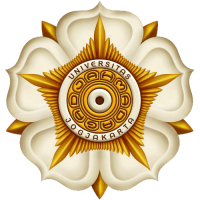Universitas Gadjah Mada (UGM) is an Indonesian public ‘ivy league’ research university located in Yogyakarta, Indonesia. Founded on December 19, 1949, UGM is the oldest and largest institution of higher learning in Indonesia. UGM is located in Yogyakarta, Indonesia, covers around 360 acre of land, and comprises of as many as 18 faculties, 68 undergraduate study programs, 23 diploma study programs, 104 master and specialist study programs, and 43 Doctorate study programs. It currently has approximately 55,000 students, 1,187 foreign students and 2,500 faculty members. Universitas Gadjah Mada has been considered to be one of the most prestigious universities in Indonesia.
The Special Region of Yogyakarta of where UGM is located, is one of the smallest provinces in Indonesia and has been widely known as a centre of Javanese culture as well as a centre of learning. It has 3,400,000 inhabitants, 511,000 of whom reside in the city of Yogyakarta. Its designation as a centre of learning is marked by the existence of 120 state and private tertiary educational institutions, with a student population of over 300,000.

